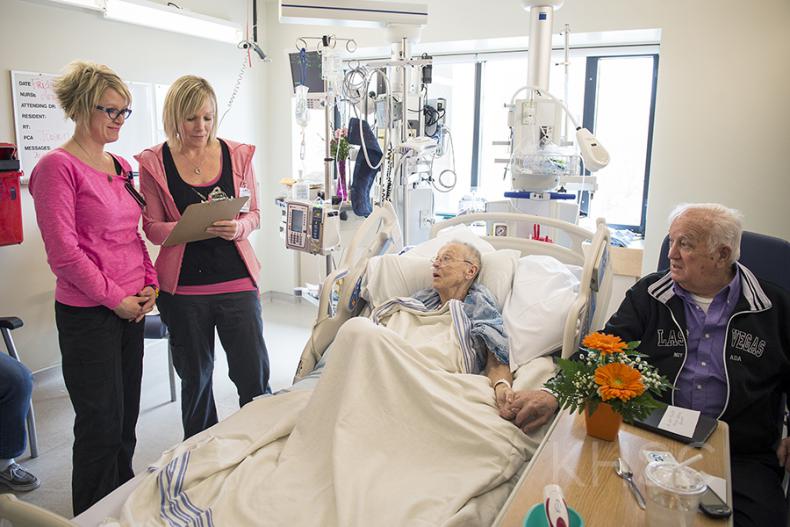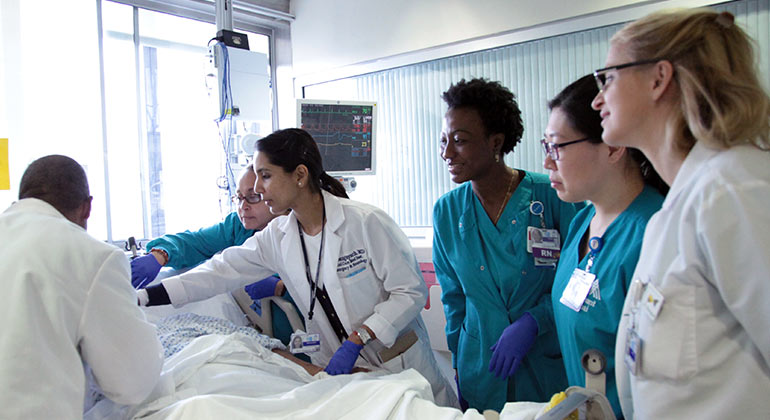- Home
- Questions to Ask
ICU Patient Questions to Ask
ICU patient questions to doctors and nurses help to settle everyone down.
Having a loved one or friend in the ICU is a whole new and very upsetting experience.
Everyone working in the ICU wants all the patients to recover.It always works better when confrontations can be avoided.
Stress usually brings out the worst in many of us. However, continually updated, truthful information helps keep things calm and acceptable.
It's extremely important to know whom you should talk to and what to ask.

Who Should You Talk to
Doctors
Most conflicts develop because of a breakdown in communications,
The Attending ICU doctor should have the most up to date information.
Write down any questions you or other family member may have. During this stressful time, its very easy to forget important questions.
You should always try to talk to the same doctor. It can be helpful to plan a specific time to meet each, day even if just for a few minutes.
After a week or so the Attending doctor may change. If you have not seen the doctor for 2 days, ask the nurse if there has been a change and who is now in charge.
Be sure to express all your concerns. If things are not going as expected, ask why. Be sure you understand what you are being told. If still confused, tell the doctor and ask your question again.
If you are concerned about any of your loved one's care, discuss it with the Attending ICU doctor. If a nursing issue, speak to the head nurse.
Do not be shy about expressing your concerns. Do not be angry either. This never helps the situation.
This is not a power play between you, your family and the ICU team. Everyone wants your loved one to improve and be able to leave the ICU
The most important and correct information will come from asking questions to the Attending ICU doctor and the bedside nurse.
First, find out and identify the Attending doctor and ask him or her your I questions. The bedside nurse can tell you his or her name name and point them out to you.
In the ICU, there may be several doctors involved. The Attending ICU doctor is overall in charge and should be aware of all that is going on.
The ICU doctor will often ask other specialist doctors to consult and provide advice on caring for your loved one.
Feel free to also talk to these consultants. This can be helpful and ensure that you are up to date on what is happening.
If you you still need more information or don't understand everything, contact me and I'll answer as quickly as I can.
In ICU 's that have residents in training, be very careful whom you talk to. Residents are not always the best source of what will happen next.
It's usually best to talk to the Attending ICU doctor. He or she is the boss and should be informed about all the care being given.
Talking to any of specialist consultant doctors can usually be helpful and ensure that you are up to date on what is happening.

You and the Attending should try to meet at a specific time each day. Sometimes emergencies can interfere with this meeting.
It helps to write down questions in advance. If you don't understand the answer, ask that it be repeated in simpler language. Doctors forget we all don't know medical words.
There is nothing wrong with repeating an ICU patient question, especially if it helps you to better understand things.
Make sure you know all your loved one's problems. Which are worsening and which are improving. Ask about the chances for recovery.
Be sure to ask why a procedure is being done, how it will help and how risky it might be.
Try to focus on the big picture. Worrying about every blood pressure change or lab result will not help. Let the doctors deal with the details.
Nurses
The bedside nurses are with you loved one all day. In an ICU they almost never have more than two patients.
The nurse will be able to tell you how your loved is doing that day and how their night went. He or she will know what's planned for that day.
The bedside nurse can also tell you what time the doctors will be coming by on their rounds.
If you miss seeing the doctor, the nurses can usually get a message that you would like to speak with him or her.
The nurse can also put you in touch with others such as social workers, chaplains, rehab and any others.
If asked the nurse will probably tell you how your loved one will do long term.
Because they are always there, the nurses are best source of comfort and information.

ICU Patient Questions & Large Families
The larger the family, the more important that everyone all have the same information.
One person should act as the spokesperson for the others. That person should ask the questions and relay the answers to everyone else.
From time to time such as weekly or when major decisions need to made, a family conference with the doctors, nurses and others may be needed.
This usually requires some scheduling in advance. Those who cannot be there in person, can usually attend by phone.
The conference is the time when any family member can ask questions until satisfied that they completely understand what is happening and what can be done.
Many times when a patient is not doing well, frustration sets in and can lead to anger. The more you know by asking questions the less the anger.
Every person working in that ICU is trying to get your loved one better.
Questions to Ask
For the doctors
For the nurses
- When can we visit?
- Can we bring small children
- Can anyone stay all night?
- Will we be called at night if anything changes?
- Can we stay in the room during a procedure?
- How do you know when our loved one is in pain?
- Why is or he or she not always responsive when we visit?
- Which doctor should we be talking to?
- What do all these other people do?
- How do we arrange for a minister, priest, rabbi or other religious to visit?
- Is there any place to wait, besides the waiting room?
- Is there any place nearby to stay at night?